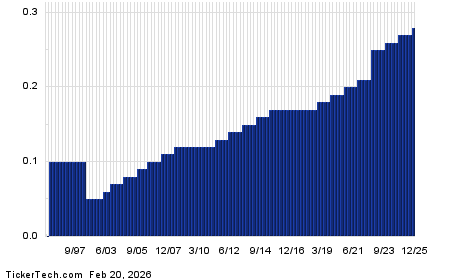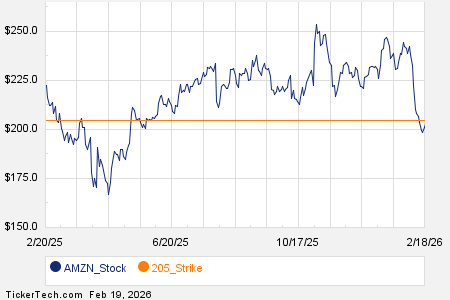Nvidia’s Dominance in AI Fuels Stock Growth and Future Prospects
Nvidia (NASDAQ: NVDA) was the top performer in the S&P 500 (SNPINDEX: ^GSPC) for 2023 and is currently the fourth-best performer year-to-date in 2024. Its stock price has skyrocketed by 845% during this time, thanks to remarkable earnings growth driven by high demand for its graphics processing units (GPUs).
Nvidia is well-positioned to deliver strong returns again in 2025, primarily due to its leading role in the artificial intelligence (AI) accelerators market, projected to grow by 29% annually until 2030, as noted by Grand View Research. However, other significant factors also contribute to its promising outlook.
Continue reading to find out more.
Staggering Demand for Blackwell GPUs
Analysts from Forrester Research, led by Mike Gualtieri, noted, “Without Nvidia’s GPUs, modern AI wouldn’t be possible.” Nvidia’s dominance stems from two key reasons: first, its GPUs are supported by an unrivaled ecosystem of software tools known as CUDA; second, Nvidia’s GPUs consistently outperform competitors when it comes to AI training and inference tasks.
On top of that, Nvidia is ramping up production of its next-generation Blackwell GPU, which boasts capabilities up to four times faster for AI training and thirty times faster for AI inferencing compared to the previous Hopper GPU architecture. CFO Colette Kress stated that “Blackwell demand is staggering,” with the new chip already sold out for the next 12 months.
Moreover, CEO Jensen Huang has claimed that the Blackwell GPU architecture might be Nvidia’s most successful product ever, setting the stage for considerable sales growth in the coming year.
Stabilizing Gross Margins Ahead
Nvidia’s gross margin peaked at 78.4% in the first quarter of fiscal 2025, ending in April 2024, but has since contracted to 74.6%. Skeptics point to competition as the cause of this decline in pricing power. Nevertheless, it’s essential to note that Nvidia’s operating margin remains 18 percentage points higher than that of its closest competitor within the Magnificent Seven.
While Nvidia does face competition from other chipmakers and even some clients, such as Amazon, Microsoft, and Alphabet, which have developed custom AI accelerators, these competitors lack the robust software development ecosystem provided by CUDA that Nvidia has cultivated over nearly two decades. This factor makes competing chips less attractive to developers.
Consequently, near-term threats to Nvidia shareholders appear limited. CFO Colette Kress predicts that Blackwell should stabilize gross margins in the mid-70% range following the production ramp. This suggests that while margins may decrease slightly in the upcoming quarters, they are likely to rebound later, undermining fears about losing pricing power.
As Morgan Stanley analyst Joseph Moore remarked, “The market tends to underestimate the difficulty of competing with Nvidia.” This realization could lead to significant stock appreciation next year as investors better understand Nvidia’s market strength.

Image source: Getty Images.
Potential Corporate Tax Cuts on the Horizon
President-elect Donald Trump has proposed reducing the federal corporate tax rate to 15%. Although a lower corporate tax rate doesn’t always lead to widespread market gains, it could positively impact individual companies by increasing profit margins. This, in turn, may allow companies to return more money to shareholders through stock buybacks and dividends.
In the past year, Nvidia repurchased about $26 billion in stock, ranking fourth in share buybacks among S&P 500 companies. The only firms with larger buyback amounts were Apple at $96 billion, Alphabet at $63 billion, and Meta Platforms at $41 billion, according to S&P Global.
If corporate tax cuts come to fruition, Nvidia could ramp up its stock repurchases, potentially accelerating growth in earnings per share as the number of outstanding shares decreases. Thus, lower corporate taxes could enhance Nvidia’s earnings growth beyond Wall Street’s expectations, driving stock prices higher.
Nvidia Stock Valuation Appears Attractive
Despite Nvidia’s market value increasing more than nine-fold since early 2023, its stock remains comparatively reasonably priced, particularly in relation to other AI companies.
Wall Street anticipates a 50% growth in Nvidia’s adjusted earnings over the next year, with the stock trading at 52.7 times adjusted earnings. This results in a price-to-earnings-to-growth (PEG) ratio slightly above 1. Here are the PEG ratios for other leading AI stocks:
- Alphabet: 1.6
- Amazon: 1.7
- Apple: 3.5
- Meta Platforms: 1.8
- Microsoft: 3.9
- Palantir: 6.2
Generally, PEG ratios below 1 are seen as cheap, while those between 1 and 2 are considered reasonable. In this light, Nvidia’s stock price of $138 appears quite attractive, positioning it for strong returns in the upcoming year.
Seize This Rare Investment Opportunity
If you’ve ever felt like you missed out on successful stock investments, this is an opportunity to consider.
Occasionally, financial analysts issue a “Double Down” stock recommendation for companies they believe are about to experience a surge. If you’re concerned you missed your chance, now may be the best opportunity to invest before it’s too late. Here are some illustrative performances:
- Nvidia: If you invested $1,000 when we doubled down in 2009, you’d have $358,460!*
- Apple: If you invested $1,000 when we doubled down in 2008, you’d have $44,946!*
- Netflix: If you invested $1,000 when we doubled down in 2004, you’d have $478,249!*
Right now, we’re issuing “Double Down” alerts for three exceptional companies, and this chance may not come again soon.
See 3 “Double Down” stocks »
*Stock Advisor returns as of November 25, 2024
John Mackey, former CEO of Whole Foods Market, an Amazon subsidiary, is a member of The Motley Fool’s board of directors. Suzanne Frey, an executive at Alphabet, is a member of The Motley Fool’s board of directors. Randi Zuckerberg, a former director of market development and spokeswoman for Facebook and sister to Meta Platforms CEO Mark Zuckerberg, is a member of The Motley Fool’s board of directors. Trevor Jennewine has positions in Amazon, Nvidia, and Palantir Technologies. The Motley Fool has positions in and recommends Alphabet, Amazon, Apple, Meta Platforms, Microsoft, Nvidia, Palantir Technologies, and S&P Global. The Motley Fool recommends the following options: long January 2026 $395 calls on Microsoft and short January 2026 $405 calls on Microsoft. The Motley Fool has a disclosure policy.
The views and opinions expressed herein are the views and opinions of the author and do not necessarily reflect those of Nasdaq, Inc.






